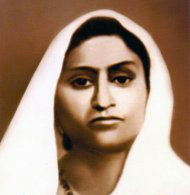Nirupama Devi | |
|---|---|
 | |
| Born | Nirupama Devi 5 May 1883 |
| Died | 7 January 1951 (aged 67) |
Nirupama Devi ( Bengali: নিরুপমা দেবী) (7 May 1883 – 7 January 1951) [1] was a fiction writer from Berhampore in Murshidabad district. Her literary pseudonym was Srimati Devi.
Early life and education
Nirupama Devi's father was Nafar Chandra Bhatta who was a judicial employee. She was educated at home. [2]
Critical reception
In 2013, Swapna Dutta writes for The Hindu that Nirupama Devi was an author who "wrote fearlessly about the social ills of the time: polygamy, forced marriages, dowry-related torture, and the heartbreak of widowhood or of being discarded by the husband for no fault of theirs," "wrote about society’s ruthless attitude to widows who dared to fall in love and, most of all, the utter helplessness of women in a male-dominated world," and "told the stories from a woman's perspective." [3]
Works
Uchchhrinkhal was her first novel. Her other works include:
- Annapurnar Mandir (1913), a same name film was made by Naresh Mitra in 1954.
- Didi (1915) [3] [4]
- Aleya (1917)
- Bidhilipi (1919) [3]
- Shyamali (1919) [3]
- Bandhu (1921)
- Amar Diary (1927)
- Yugantarer Katha (1940)
- Anukarsa (1941) [3]
Awards and honours
Nirupama Devi received the 'Bhubanmohini Gold Medal' in 1938 and 'Jagattarini Gold Medal' in 1943 from the University of Calcutta in recognition of her contribution to literature.
See also
References
- ^ Women Writing in India: The twentieth century. Feminist Press at CUNY. 1993. p. 106. ISBN 9781558610293.
- ^ "Devi, Nirupama - Banglapedia". en.banglapedia.org. Retrieved 2017-11-08.
- ^ a b c d e Dutta, Swapna (August 3, 2013). "The home and the world". The Hindu. Retrieved 21 June 2021.
- ^ Women Writing in India: 600 B.C. to the early twentieth century. Feminist Press at CUNY. 1991. p. 363. ISBN 9781558610279.